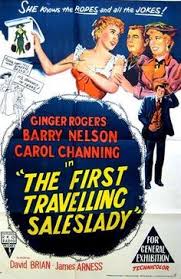
THE FIRST TRAVELLING SALESLADY
US, 1956, 93 minutes, Colour.
Ginger Rogers, Carol Channing, Barry Nelson, James Arness, David Brian, Clint Eastwood.
Directed by Arthur Lubin.
The First Travelling Saleslady is a very light and pleasant comedy. The stars are all older than they should be for this kind of story – Ginger Rogers being 45 at the time of making the film (and talking about having a family), Barry Nelson a star of the 1940s, David Brian a star of the 1940s and 50s, and James Arness about to make an impact on the small screen with Gunsmoke. Each of the three men is quite genial even when clashing with Rose, the saleslady.
There are two big surprises in the film. The first is the presence of Carol Channing who had only made one film, Paid in Full in 1950, and who was to have a career on stage rather than on screen, though getting Oscar-nominated for Thoroughly Modern Millie in 1967. She is very tall, resembling Gwyneth Paltrow considerably, a good comedienne, singing with both deep voice and in the voice that audiences remember. The second surprise is the presence of Clint Eastwood, in an awe-shucks kind of performance, aged 25. While had appeared in a number of films, he had made no particular mark, was soon to appear in Rawhide but his breakthrough in A Fistful of Dollars came eight years later – but, then, no looking back.
The film was directed by Arthur Lubin, director of six of the Francis films and other films with a light touch, like Lady Godiva of Coventry.
1. Pleasantly colourful story, the role of women in the US, in the West? 1897? Foreseeing the emancipist movement, feminism?
2. Colour photography, light and bright, New Jersey, the cities? The contrast with Texas, the desert, the towns? The musical score? Carol Channing and the song about corsets?
3. The title, the emphasis? The introduction about salesman? The challenge of the women?
4. Rose, her personality, her work with corsets, design, hopes of sales, the promotions, the song for the salesman – his interest but his reluctance because of the times? Her plans, her horse and cart, the crash with Charles, his horseless machine, giving her a lift? Her annoyance, the attraction? His continually turning up, his wisecracks, in the hotel, her ousting him from the room, his car, her using it, getting lifts, participation in the final cattle run, the happy ending – in the car?
5. Molly, Carol Channing and her screen presence, her vocal range, deep and her characteristic screech, the song? Her friendship, modelling, supporting Rose? The hotel, the encounter with John Rice, the attraction, his response to her, going to camp, the later encounters, present in the court, happily going off with him? (The surprise of seeing Clint Eastwood in this role?).
6. The salesman with the barbed wire, his being persuasive with Rose, her agreeing to sell barbed wire, the transport in the corset boxes? His love for her, arrival in Texas, the clash with Joel Kingdom, the proposal? Accepting his fate?
7. Texas, the hotel, being full, the suite for the Prince of Wales, Rose and Molly pretending to be working for him, going to the room with Joel Kingdom, the tall Texan, attracted to Rose, her guile, his giving up his room? The later presence of the real Prince of Wales?
8. Joel discovering the truth, his turning out the women, their finding a place to stay? Trying to sell the corsets, the Indian women not responding, the men wearing them…?
9. Going to Joel’s house, the party, his proposal? Consoling himself with the barbed wire salesman?
10. The court sequences, Rose arguing her case? The questions? The men not wanting barbed wire, assuming it would injure the cattle? Rose and her planning the meeting, going to meet the women, the men dominating them and their not coming? The women’s presence in court?
11. Putting up the barbed wire, running the cattle through the town, Charles and his horseless machine, urging them on, the cattle not being injured?
12. The success of barbed wire? The changing of the West and the control of cattle?
13. The comments about the suffragettes, women’s emancipation, in the hindsight of the 1950s?